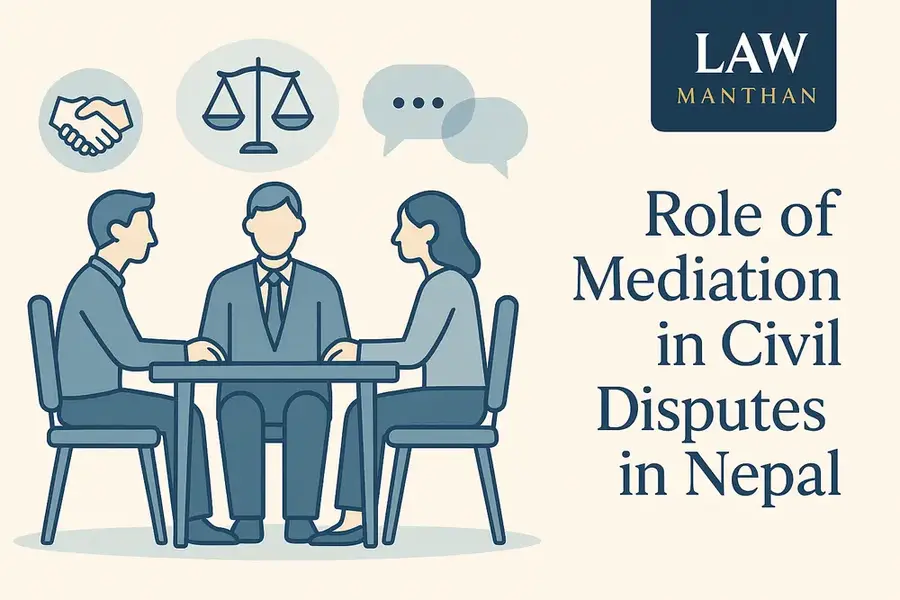In Nepal, civil disputes have been a part of society for centuries. Traditionally, many disputes were settled within the community by elders or religious leaders. Today, with modern legal systems, courts handle most civil cases. However, court processes can be slow, expensive, and stressful. To solve this problem, mediation has become an important method for resolving civil disputes in Nepal. Mediation offers a friendly, fast, and affordable way to solve problems without needing a full court trial. It respects relationships, saves time, and gives people more control over the outcome of their disputes.
What is Mediation?
Mediation is a process where two or more people in a conflict sit together with a neutral third party, called the mediator, to find a solution. The mediator does not decide who is right or wrong. Instead, they help both sides talk openly, understand each other’s views, and reach an agreement they both accept. In Nepal, mediation is supported by the Mediation Act, 2068 (2011) and Civil Procedure Code, 2074 (2017). Courts also encourage mediation before proceeding with a full trial.
Importance of Mediation in Civil Disputes
In a society like Nepal, where relationships and social harmony matter deeply, mediation fits naturally. Mediation plays a big role in resolving many types of civil disputes. Whether it is a fight over land, property division among family members, divorce, or a business contract issue, mediation can help people solve problems without creating more bitterness.
Mediation is important because it is: Less expensive than going to court, Faster and saves valuable time, Flexible, allowing people to create their own solutions, Confidential, meaning private matters stay private, Relationship-friendly, helping people maintain or even rebuild relationships.
Law Supporting Mediation in Nepal
- Mediation Act, 2068 (2011): It provides the structure for mediation outside courts and inside courts (court-referred mediation). It defines who can be mediators, how mediation should be conducted, and how agreements are enforced.
- Civil Procedure Code, 2074 (2017): This law makes mediation a mandatory step in many civil disputes filed in the court which is mentioned in sections like Section 193, 194 and 195.
- Local Government Operation Act, 2074 (2017): This law allows local governments (like rural municipalities and municipalities) to mediate minor disputes through village mediation centers.
Thus, Nepal’s laws recognize mediation not only as an option but often as a necessary step before a court trial.
Court-Annexed Mediation
In Nepal, when a civil case is registered, the judge first examines whether the case can be resolved through mediation. If it is suitable, the case is referred to the court’s mediation center.
Court-annexed mediation centers exist in almost all District Courts and some High Courts. Trained and certified mediators are appointed to handle cases. Parties are asked to attend mediation sessions before the case proceeds in court.
If mediation is successful, the agreement reached is signed by both parties and approved by the court. This agreement is legally binding and has the same power as a court judgment. If mediation fails, the case returns to the normal court trial process.
Community Mediation
Apart from court mediation, Nepal has a strong practice of community mediation. Organizations like the Centre for Legal Research and Resource Development (CeLRRd) and The Asia Foundation have helped establish many community mediation centers across the country.
In rural areas, trained mediators from the community help resolve family fights, neighbor disputes, land boundary issues, and other civil problems. Community mediation is especially important in Nepal because many people in villages find court procedures difficult, costly, and intimidating.
Mediation in Family and Property Disputes
Family-related civil disputes like divorce, child custody, partition of property, and inheritance are highly emotional. Mediation provides a sensitive environment where parties can express their concerns and feelings freely. For example, in a divorce case, rather than fighting over money or children in a public courtroom, couples can discuss their issues privately through mediation and reach a solution that is better for them and their children. Similarly, in property partition cases, mediation helps in avoiding years-long fights that would otherwise destroy family bonds.
Advantages of Mediation over Court Trials
- Especially in family, neighbor, or business disputes, mediation helps to preserve long-term relationships.
- Filing fees, lawyer charges, and other expenses are much lower in mediation.
- Cases that might take years in court can be resolved within weeks through mediation.
- Unlike court cases, which are public, mediation sessions are private. Sensitive matters remain confidential.
Challenges in Mediation Practice
Many people still do not know about mediation or think it is less powerful than court decisions. Not all areas have strong mediation centers or enough trained mediators. The government, NGOs, and legal professionals are working to solve these challenges through training, public awareness campaigns, and better implementation of mediation laws.
The Future of Mediation in Nepal
Mediation has a bright future in Nepal. The government and the judiciary are strongly supporting the use of mediation. As courts become more crowded with cases, mediation offers a way to reduce the burden on the judicial system. Educational programs on mediation are being included in legal training. Many young lawyers are learning mediation techniques. Local governments are investing in strengthening local mediation centers. Digital technology also offers the possibility of online mediation, especially after the COVID-19 pandemic taught people to use remote communication methods. In the coming years, mediation can become the first choice for civil dispute resolution in Nepal, bringing faster, cheaper, and more peaceful justice to the people.
Conclusion
Mediation is a powerful tool for resolving civil disputes in Nepal. It respects the values of Nepalese society- peace, dialogue, and community harmony. It saves time, money, and relationships while offering fair and flexible solutions. Through legal support, community involvement, and growing public awareness, mediation is becoming stronger day by day. While challenges remain, the overall path is positive. For a country like Nepal, where social ties are deep and court processes can be heavy, mediation offers a golden bridge between conflict and peace. It truly represents the future of civil justice in Nepal.




